Blog Posts Tagged Technical Content
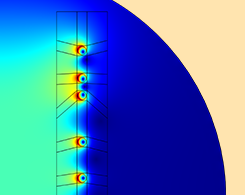
How to Optimize the Spacing of Electromagnetic Coils
Did you know that you can maximize the magnetic field strength of your electromagnetic coil designs by optimizing the spacing between the coils?

3 Ways to Optimize the Current in Electromagnetic Coils
We give you 3 ways to optimize the current in electromagnetic coil designs using the AC/DC Module and Optimization Module, add-on products to COMSOL Multiphysics®.
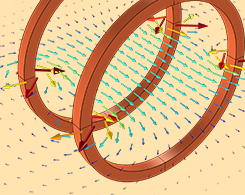
How to Postprocess Fields over Arbitrary Geometries
Check out this useful modeling trick: You can query the results of your model within an arbitrary geometric subregion by implementing an integration during postprocessing.

Building COMSOL Multiphysics Models with Excel® and Visual Basic®
Say you want to base your model on data kept in the Excel® spreadsheet software. Using LiveLink™ for Excel®, you can interface between the spreadsheet and the COMSOL Multiphysics® software.
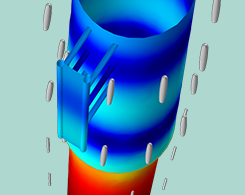
Model Electrodes with Nonideal Connectivity in Corrosion Analyses
Learn the appropriate boundary conditions for performing a corrosion analysis in which an electrode is connected to an external short circuit.
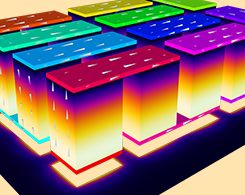
How to Analyze Thermoelectric Cooler Designs with a COMSOL App
A simulation application, such as one for a thermoelectric cooler design, can be used to test a variety of parameters in order to optimize a device for a specific use.
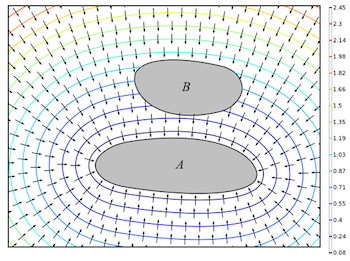
How to Compute Distances Between Objects in COMSOL Multiphysics®
Compute the distance between two deforming objects in the COMSOL Multiphysics® software. Here’s how…
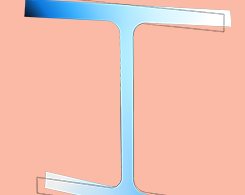
How to Analyze Beam Sections Using the Beam Section Calculator
Simulation applications can be used as utility tools to compute the properties and parameters of a component or device. In this example, the application analyzes beam section geometries.
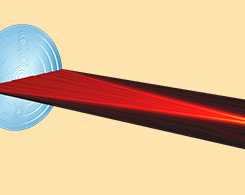
How to Implement the Fourier Transformation from Computed Solutions
In this wave optics demonstration, learn how to implement the Fourier transformation for computed solutions, using the example of an electromagnetic simulation of a Fresnel lens.
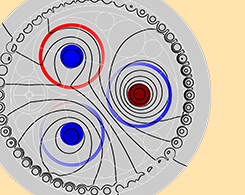
How to Model the Electromagnetic Heating of Underground Cables
Underground power cables are beneficial in many ways, but they are also subject to overheating. To design better cables, we can model their electromagnetic heating in COMSOL Multiphysics.
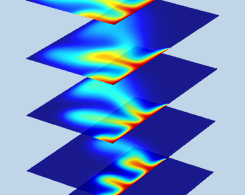
Which Porous Media and Subsurface Flow Interface Should I Use?
We go over a comprehensive selection of porous media and subsurface flow interfaces available to you in the COMSOL® software so that you can find the right choice for your modeling objective.
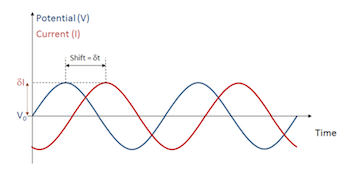
Electrochemical Impedance Spectroscopy: Experiment, Model, and App
Experience the phenomenon of electrochemical impedance spectroscopy (EIS) in 3 ways: experiment, model, and simulation application.
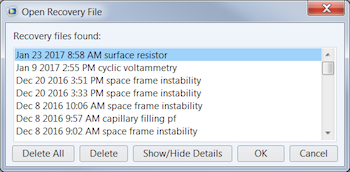
How and When to Open Recovery Files in COMSOL Multiphysics®
If, by chance, the software shuts down before your simulation converges, just use the Open Recovery File feature to pick up where you left off and find your model’s solution.
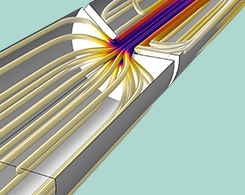
Fat-Washing Cocktails on an Industrial Scale
Bacon-flavored vodka? Pecan-infused bourbon? The fat-washing process extracts the flavors from fat and dissolves it into alcohol, and it can even be scaled up to an industrial level.
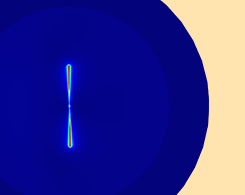
How to Couple a Full-Wave Simulation to a Ray-Tracing Simulation
Learn how to couple full-wave and ray-tracing simulations in a model with a nonhomogenous domain around the antenna. Part 4 of a series on multiscale modeling in high-frequency electromagnetics.
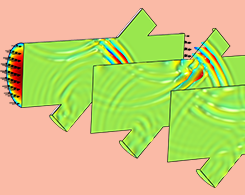
Using the Discontinuous Galerkin Method to Model Linear Ultrasound
You can easily model acoustically large problems, like linear ultrasound, with a predefined physics interface that uses a memory-efficient approach called the discontinuous Galerkin method.
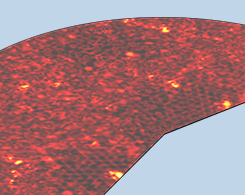
Finding the Best Coal Arrangement for Even Heat in a Grill
Pizza on the grill? It’s actually quite delicious. Here, we use heat transfer modeling to determine how the grill’s coals should be arranged for even heating.
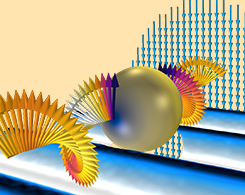
How to Couple Radiating and Receiving Antennas in Your Simulations
Learn how to couple radiating and receiving antennas in your simulations by using the scattered field formulation. Part 3 of a series on multiscale modeling in high-frequency electromagnetics.
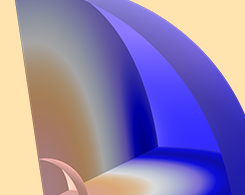
2 Methods for Simulating Radiated Fields in COMSOL Multiphysics®
2 ways to model radiated fields: the Far-Field Domain node and the Electromagnetic Waves, Beam Envelopes interface. Part 2 of a series on multiscale modeling in high-frequency electromagnetics.
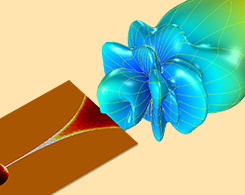
Introduction to Multiscale Modeling in High-Frequency Electromagnetics
Here’s an introduction to performing multiscale analyses of antennas and communication systems. Part 1 of a series on multiscale modeling in high-frequency electromagnetics.

How to Model an Anechoic Coating
Modeling an anechoic coating involves finding the smallest unit cell, truncating the geometry, and analyzing the wave diffration. The COMSOL® software includes predefined interfaces to do so.
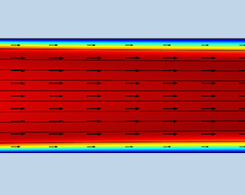
How to Assign Fluid Pressure in CFD Simulations
What is the difference between relative and absolute pressure? Why does COMSOL Multiphysics® use relative pressure to solve CFD problems? Get answers here…
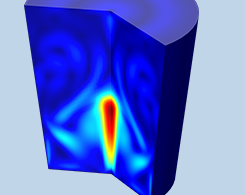
Introduction to Modeling Natural Convection in COMSOL Multiphysics®
Electronics cooling, indoor climate systems, and environmental transport problems all rely on natural convection. Get an introduction to modeling this phenomenon in COMSOL Multiphysics®.

How to Run Simulations in Batch Mode from the Command Line
Your step-by-step guide to efficiently running COMSOL Multiphysics® simulations in Batch mode from the command line.
